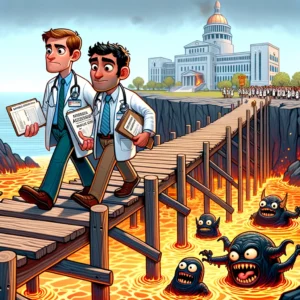
Admissions Consultant Answers 10 Common Questions About Medical School Applications
Medical school is, by far, the most difficult and demanding application process. Far more rigorous than an MBA, law school, or PhD application… and for good reason! A bad MBA or lawyer still gets a corner office and a job, but a bad doctor can kill you!
Because applying to medical school is such a rigorous and competitive process, a well-crafted application can make all the difference. To help you navigate this journey, we’ve gathered ten common questions about medical school applications and provided brief responses. This guide is a great place to begin your medical school application process! For additional help, contact us at Gurufi.com. Every year, we help hundreds of applicants refine their AMCAS (and other) personal statements, Work & Activities sections, and secondaries.
1. What is the purpose of the AMCAS personal statement?
The AMCAS personal statement sends shivers of terror down people’s spines. You have 5300 characters (not even two pages) to describe your life, give your “doctor’s origin story” and make it clear why you’d be an amazing doctor. In short, this is the centerpiece of your application. The AMCAS personal statement is your opportunity to introduce yourself to the admissions committee and explain why you want to pursue a career in medicine. It should highlight your motivations, experiences, and personal qualities that make you a suitable candidate for medical school. This statement is crucial because it provides a holistic view of who you are beyond your grades and test scores, allowing the committee to understand your passion for medicine and your readiness for the challenges of medical school. It provides the frame for your application and the lens through which all of your other materials are viewed.
2. How can I effectively describe my clinical experiences in my medical school personal statement?
Tell stories. Next question. Okay, I’ll elaborate a bit! (if you’re interested, check out this video on storytelling we did for MBA applicants. The examples we use are for business students, but the core ideas, themes, and strategies still apply!)
To effectively describe your clinical experiences in your personal statement, focus on specific examples that highlight your involvement, responsibilities, and what you learned from these experiences. Discuss how these experiences shaped your understanding of the medical field and reinforced your desire to become a physician. Be sure to reflect on the impact these experiences had on you, both personally and professionally, and how they have prepared you for a career in medicine.
If you’re doing clinical work, such as volunteering or scribing, I would urge you to use our Scribing Journaling tool to help you begin to put your ideas together.
3. What should I include in the Work & Activities section of the AMCAS application?
A good rule of thumb for the AMCAS personal statement is that you should use that essay to demonstrate, in depth, a few things about your experience, accomplishments, and aspirations. Depth, not breadth, is the key. For the Work & Activities section of the AMCAS, use these mini-essays to show breadth. Complement what you’ve highlighted in the personal statement. For instance, if your personal statement is mostly clinical, then use the W&A to detail research or leadership. Be strategic about your “Most Significant” longer essays to provide / show greater breadth. You want your application to showcase your extracurricular involvement, employment, research, and volunteer experiences. Include detailed descriptions of your roles and responsibilities, highlighting any leadership positions, accomplishments, and skills you developed. Focus on activities that demonstrate your commitment to medicine, community service, and personal growth. Additionally, choose the most meaningful experiences to provide further insights into your character and values.
4. How can I write a strong secondary application essay for medical school?
If the AMCAS is the core pitch you send to all schools, then secondaries are tailored and specific. Writing a strong secondary application essay involves making your responses to each school responsive to what they’ve asked and, more than that, making sure it aligns with that school’s values, culture, and areas of strength. In short, if the AMCAS is designed to show that you’re a compelling candidate, in general, then secondaries are about proving that you’re a great fit for that particular school. Research each medical school to understand its values, mission, and unique programs. Use this information to craft thoughtful and personalized essays that reflect your alignment with the school’s goals. Be concise and focus on answering the prompt directly while providing specific examples from your experiences.
5. What are common mistakes to avoid in medical school personal statements?
Common mistakes to avoid in medical school personal statements include:
1. **Being too vague:** Provide specific examples and detailed descriptions rather than broad generalizations. If you can’t match a story to an assertion, don’t make it.
2. **Focusing too much on others:** While it’s important to acknowledge the influence of mentors, make sure the statement centers on your experiences and insights. After all, this is a PERSONAL statement, so make sure that you remain the main character in it.
3. **Ignoring the prompt:** Ensure your essay answers the specific question or prompt provided by the application. This problem often arises when, perhaps late in the application process, you can’t find the juice to write one more new secondary, so you figure that you’ll just try to shoehorn in an old essay… even if it doesn’t quite fit. Don’t do this.
4. **Neglecting to proofread:** Spelling and grammatical errors can detract from your professionalism. Proofread your essay multiple times and consider having others review it.
6. How can I convey my passion for medicine in my personal statement?
Again… storytelling. To convey your passion for medicine, share personal anecdotes that illustrate your commitment and enthusiasm for the field. Discuss formative experiences that inspired you to pursue medicine, such as volunteering in a healthcare setting, shadowing physicians, or overcoming personal health challenges. Reflect on what these experiences taught you and how they solidified your desire to become a physician. Authenticity is key, so be honest and heartfelt in your writing.
7. What experiences should I highlight in my medical school personal statement?
Highlight experiences that demonstrate your readiness for medical school and your suitability for a career in medicine. These may include:
1. **Clinical experiences:** Volunteering, shadowing, or working in healthcare settings.
2. **Research projects:** Participation in scientific research that showcases your analytical skills and commitment to advancing medical knowledge.
3. **Community service:** Involvement in volunteer activities that reflect your compassion and dedication to helping others.
4. **Leadership roles:** Positions in student organizations, work, or community groups that highlight your ability to lead and work collaboratively.
5. **Personal challenges:** Overcoming obstacles that have strengthened your resilience and determination to pursue medicine.
8. How do I handle the ‘Why this medical school?’ secondary essay?
To effectively handle the ‘Why this medical school?’ secondary essay, research the specific features and programs of each school. Identify aspects that resonate with your career goals, values, and interests. Discuss how these features align with your aspirations and how you would contribute to and benefit from the school’s community. Be specific about what attracts you to the school, such as particular faculty, research opportunities, or unique programs, and explain why these aspects are important to you.
This is an important thing to answer, so I’d even hop on forums or LinkedIn to cold-chat with current students there to gain insights. As you research schools to apply to, ask yourself over and over, “could I see myself thriving here? Why?” The answers to these questions could help to guide your secondaries.
9. How can I make my AMCAS application stand out?
In addition to the tips I’ve laid out above, make sure that you avoid overused topics. Don’t begin the essay at the bedside of your dying grandma or talk about how the first time you saw a doctor it was like their white coat was a superhero cape… those tropes have been overused.
10. What should I focus on in the ‘Most Meaningful Experiences’ section of the AMCAS application?
In the ‘Most Meaningful Experiences’ section of the AMCAS application, focus on providing detailed descriptions of experiences that had a significant impact on your personal and professional development. Discuss what made these experiences meaningful, the skills and insights you gained, and how they have prepared you for a career in medicine. Reflect on your growth and the lessons learned from these experiences, and explain why they stand out among your other activities.
The main tip I would give is that you should look to complement your personal statement. If there are things that you didn’t cover in your personal statement and you think they’re important, use your Most Meaningful essays on them. Remember, you should view your application holistically, and don’t try to jam everything into just the personal statement. The entirety of the application should cover all the main topics and strengths, so make sure that your personal statement provides enough space for the most important 1-2 ideas to breathe and have a full genuine impact. Then, use the Most Meaningful to show that you’ve had a well-rounded set of experiences and accomplishments.
As the husband of a doctor and the brother of two doctors, I know just how meaningful a medical career can be, so try to approach all of this from a position of optimism, excitement, and joy. Yes, it’ll be a slog, but people who are enthusiastic, confident, and positive in their mindset tend to be more interesting and attractive to admissions committees. Yes, this is the start of a long process and a difficult journey, but it’ll be worth the investment.
For more help with your personal statement, check us out at Gurufi.com. Our personal statement editors and consultants have decades of experience helping clients get into top medical schools. Our specialty is helping you craft compelling personal statements, AMCAS W&A, and secondaries that move the needle in your admissions process! For questions, shoot us an email at service@gurufi.com. Check us out on Facebook,Twitter, and LinkedIn.





